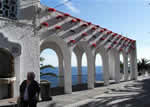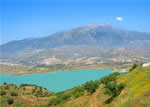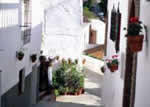
Recently I heard a story that I would like to share with you. An English man went into a bar in Cómpeta and asked for a beer.
The bartender brought it and, as he put the beer on the counter, he said with a smile “cerveza”. Next day, the same man came into the same bar and again asked for a ”beer”. The bartender did as on the previous day. This incident happened several times until one day the bartender said to the English man ”I already know how to say beer. Now, it's your turn to learn how to say beer in Spanish, since here we don't serve beer anymore, we only serve cerveza”.
Is the behaviour of this English man typical English? Was the behaviour of the Spanish bartender typical Spanish? Neither, I hope.
Spanish people in general, and people from Andalusia in particular, have a reputation for being hospitable. Furthermore, they are not stupid and know that tourism is an important source of income for them. Thus, for years they have treated tourists like guests, offering them the very best of themselves. They have even neglected their compatriots to give priority to tourists, perhaps thinking that since they have the money they are the ones who will save them from poverty. I believe it is time to review these myths and analyse what is going on.
First of all, the English man of the story is not a tourist, he actually lives here.
He came to that bar repeatedly. It is understandable that the Andalusian's are tolerant with tourists or ex-pats. After all, they cannot learn the languages of all the countries they visit. But it is reasonable to expect that foreigners who come to live in Spain make an effort to learn the language of the country where they live.
An Arabian proverb says: ´Sing the song of him whose dwelling your share´
And so do many people. they learn about the culture, the history, the language.
Secondly, it is possible that what has been called Spanish hospitality hides a poor national self-esteem. Perhaps that is the reason why for such a long time they have taken for granted that their economy depends on others rather than on themselves. Instead of believing in themselves and developing their capacities and resources, they have spent their time spoiling tourists. This hypothesis is plausible when we look at recent Spanish history. The Franco era closed Spanish frontiers to the development and progress taking place in other European countries. However, it opened the doors for Spanish artists and brains to flight and for the thousands of people who became the servants of other more developed European countries. There was a time in which many French people used Spanish names to refer to various professions: cleaning ladies for instance were called Conchitas. It is not surprising that such a curriculum has left Spanish people with a poor self-image and low self-esteem as a nation.
But times have changed radically and Spanish people have proved that, under similar conditions, they are as capable as anyone else. Look at the economic figures over the past years: Spain has the larges economical growth of the whole of Europe. The Spanish Economy grows by 3.4 % every year!!! Spain has made up its arrears in Europe within 20 years!!
So the time has come for them to take a deep breath, to walk up straight and to remind themselves how much they are worth. It is time to dignify their language and their culture beyond bull fighting and castanets. It is time to behave as the bartender in Cómpeta, gracefully teaching the foreigner his language, but letting him know that is up to him to It is time to behave as the bartender in Cómpeta, gracefully teaching the foreigner his language, but letting him know that is up to him to learn it.
.Would it be imaginable, that not learning the language for a foreigner, a tourist, or an ex-pat could be a way to hide the fear of feeling inferior or inept?
When we learn another language it is normal to feel a little stupid at the beginning. We feel frustrated because we are unable to communicate at the level of competence to which we are used to. We have difficulty to express our feelings and our thoughts. We are afraid to make mistakes.
It is possible that, with our sense of pride (and maybe superiority?) we have difficulty in accepting these feelings that are unavoidable in the process of learning a second language. As Chip R. Bell said “power inhibits learning” So do we prefer not to learn?? We should stop resisting and become more sensitive.
Spanish inhabitants in the coast villages like Fuengirola or Mijas Costa, especially those who don't speak English, are getting to the point of feeling foreigners in their own land. Adverts and posters written in Spanish are increasingly rare and there are more and more businesses in which Spanish is not spoken.Andalusian people manage this with their natural grace and sense of humour, but we may get into situations in which this is not sufficient. For that reason, to prevent extremes, the question of the use of English and Spanish should rely on a change of attitudes. For English people who feel resistance to learn Spanish because they find it too hard, I quote Marie Curie: ”We stop fearing what we have learnt to understand” .Beliefs influence the way we think and behave in such a powerful way, that what we believe becomes real. That is how beliefs generate self-fulfilled prophecies. In all cases I believe the answer is empathy; how would you feel if it happened to you in you own country??
Robin Schattefor, Santa Clara Academia de Idiomas/ Personal Coaching.



















